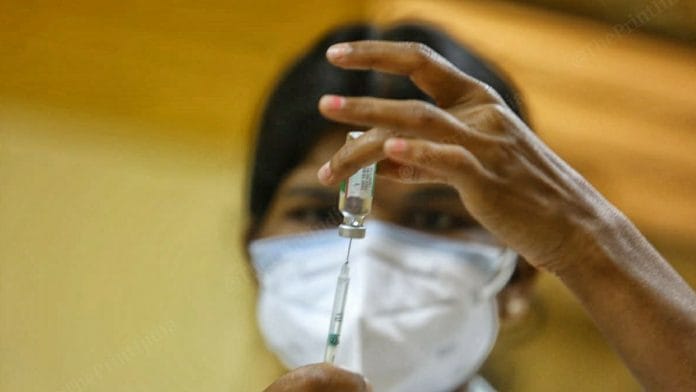New Delhi: A new research by the UK government suggests that two doses of a Covid-19 vaccine are needed to provide “strong protection” against infection caused by the coronavirus variant first identified in India, the Financial Times reported Saturday.
According to the report, which quotes two sources who briefed on the preliminary data by the Public Health England, two vaccine doses provided 81 per cent protection against the B.1.617.2 variant, first identified in India, and 87 per cent against the B.1.1.7 strain, which was first identified in Kent in southeast England.
The data, which was presented at a meeting of the UK government’s New and Emerging Respiratory Virus Threats Advisory Group (Nervtag), is from the two vaccines — BioNTech – Pfizer vaccine and Oxford-AstraZeneca vaccine.
The report quotes two sources who attended the Nervtag meeting as saying the data showed that one dose offered 33 per cent protection against symptomatic infection from B.1.617.2 variant, and 51 per cent against B.1.1.7 strain.
Also read: Virus variant in India can infect those vaccinated, but unlikely to cause severe Covid: Study
UK scientists ‘evaluating effectiveness of vaccines’
The Financial Times analysis suggests that a single shot offers 35 per cent less protection against B.1.617.2 compared with B.1.1.7.
The report also said “Public Health England scientists are evaluating the effectiveness of vaccines against the B.1.617.2 variant of Sars-Cov-2.” They will be publishing the results of this evaluation in due course.
The upcoming research is likely to emphasise the importance of taking two doses of vaccines to protect against B.1.617.2.
The scientists in the UK are aggressively working to understand “how much more transmissible B.1.617.2 is than other variants in circulation, most notably B.1.1.7.”
“Modelling released last week by government advisers suggested it could be about 50 per cent more transmissible than B.1.1.7, although new data last week implied it may not be that high,” the report said.
Also read: India’s daily average Covid vaccinations dipped by nearly 50% between April and May






